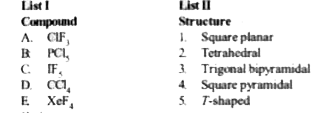Complete Solutions to EXERCISE-2: CONCEPT APPLICATOR of chapter CHEMICAL BONDING AND MOLECULAR STRUCTURE of Class 12 book with complete answers and questions
| Class 12 | CHEMISTRY |
| Chapter | CHEMICAL BONDING AND MOLECULAR STRUCTURE |
| DISHA PUBLICATION | EXERCISE-2: CONCEPT APPLICATOR |
| Number Of Questions | 30 |
| Academic Year | 2023-24 |
Correct set of species with zero dipole moment is :
(i) `CO_(2) " " (ii) COCl_(2) " " (iii) CH_(2)Cl_(2) " " (iv) BCl_(3)`
View SolutionMatch List I and List II and pick out correct matching codes from the given choices :

View SolutionWhich of the following is correct order of `sigma` - bond strength ?
I. 2s-2s
II. 2s-2p
III. 2p-2p
IV. 3s-3s
View SolutionIn pyrophosphoric acid, `H_(4)P_(2)O_(7)`, number of `sigma` and `dpi -p pi`
View SolutionArrange the following ions in the order of decreasing `X-O` bond length where X is the central atom:
View SolutionWhich of the following statements is correct in the context of the allene molecule, `C_(3)H_(4)` ?
View SolutionWhich of the following set contains species having same angle around the central atom?
View SolutionBond angle between two hybrid orbitals is `105^@` Percentage of s-orbital character of hybrid orbital is between
View SolutionThe group of molecules having identical shape is:
View SolutionThe shapes of `XeF_(4),XeF_(5)^(-) and SnCl_(2)` are :
View SolutionWhich of these statements is not true?
View SolutionThe statement true for `N_(3)^(-)` is
View SolutionThe dipole moments of diatomic molecules AB and CD are 10.41D and 10.27 D, respectively while their bond distances are 2.82 and `2.67Å` respectively. This indicates that
View SolutionThe electronegaivity difference between `N` and `F` is greater than that between ` N` and `H` yet the dipole moment of `NH_2` ( 1 .5 D) is larger than that of ` NF_3 ( 0. 2 D)`. This is because :
View SolutionThe charge/size ratio of a cation determines its polarizing power. Which one of the following sequences represents the increasing order of the polarizing power of the cationic species, `K^+,Ca^(2+), Mg^(2+), Be^(2+)`
View SolutionThe resultant dipole moment `(mu)` of two compounds `NOF` and `NO_(2)F` is `1.81 D` and `0.47D` respectively Which dipole momnet do you predict ? .
View SolutionThe `BCl_(3)` is a planar molecule whereas `NCI_(3)` is pyramidal because
View SolutionThe cylindrical shape of alkynes is due to
View SolutionThe `AsF_5` molecule is trigonal bipyramidal. The orbitals used by As for hybridisation are
View SolutionThe correct order of O - O bond length in `O_(2)H_(2)O_(2)` and `O_(3)` is
View SolutionThe number and type of bonds in `c_(2)^(2-)` ion in `CaC_(2)` are
View SolutionIn which of the following sets, all the given species are isostructural ?
View SolutionCorrect statement about `VBT` is .
View SolutionWhich of the following species used both axial set of d-orbitals in hybridisation of central atom ?
View SolutionThe relationship between the dissociation energy of `N_2` and `N_2^+` is
View SolutionBond order normally gives idea of stability of a molecular species. All the molecules viz. `H_(2) Li_(2) and B_(2)` have the same bond order yet they are not equally stable. Their stability order is
View SolutionThe internuclear distances in 0-0 bonds for `O_(2)^(+),O_(2),O_(2)^(-) and O_(2)^(2-)` respectively are :
View SolutionIn forming `(i) N_(2) rarrN_(2)^(o+)` and `O_(2)rarrO_(2)^(o+)` the electrons respectively removed from .
View SolutionThe energy of `sigma_(2s)`, is greater than that of `sigma_(1s)^**` orbital because
View SolutionWhich statement is correct?
View Solution
EXERCISE-2: CONCEPT APPLICATOR questions and complete solutions for chapter CHEMICAL BONDING AND MOLECULAR STRUCTURE of DISHA PUBLICATION CHEMISTRY (HINGLISH) of Class 12
All Exercises from DISHA PUBLICATION Class 12 CHEMISTRY CHEMICAL BONDING AND MOLECULAR STRUCTURE
- EXERCISE-1: CONCEPT BUILDER (TOPICWISE) (TOPIC 1: Electrovalent, Covalent and Coordinate Bonding)
- EXERCISE-1: CONCEPT BUILDER (TOPICWISE) (TOPIC 2: Octet Rule, Resonance, Dipole Moment and Bond Polarity)
- EXERCISE-1: CONCEPT BUILDER (TOPICWISE) (TOPIC 3: VSEPR Theory, VBT Theory and Hybridization)
- EXERCISE-1: CONCEPT BUILDER (TOPICWISE) (TOPIC 4: MOT and Hydrogen Bonding)
- EXERCISE-2: CONCEPT APPLICATOR
- JEE MAIN 5 YEARS AT GLANCE